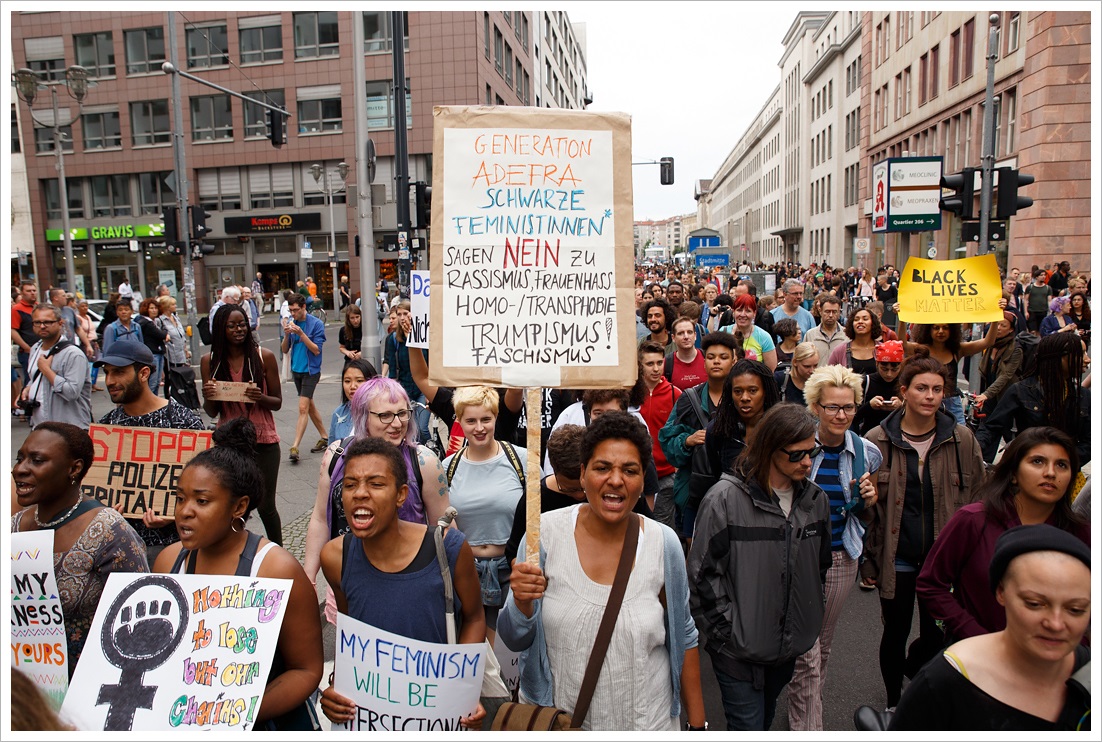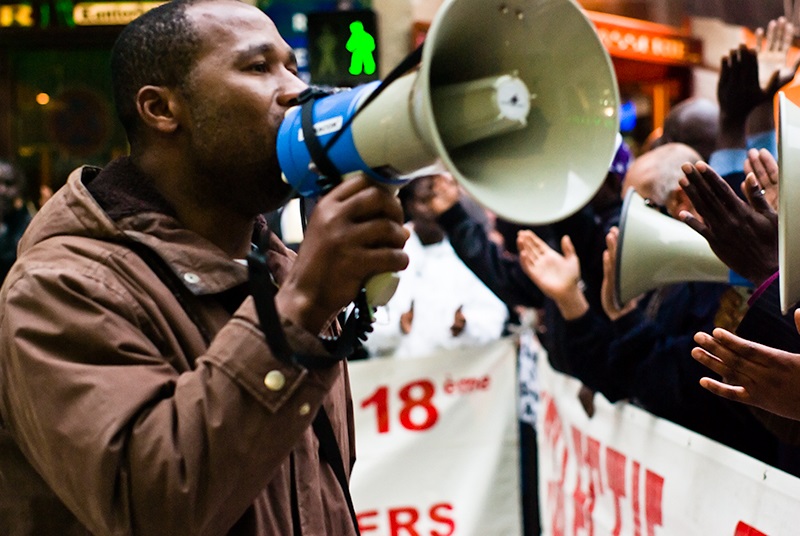Beyond the Black Paradigm? Queer Afro-diasporic Strategies
*This post is part of our new blog series on Black Europe. This series, edited by Kira Thurman and Anne-Marie Angelo, explores what it means to bring the category of Black Europe to the foreground of scholarship on Europe and the Black Atlantic.

This essay argues that it is necessary to insist on addressing the specifics of anti-Black racism rather than subsuming Blackness under the category of “people of color” and to simultaneously question the limits of dominant notions of Blackness. I propose that Black queer activism in Europe offers a model for this.
Afro-diasporic strategies responding to the global rise of neo-nationalisms are urgently needed: violence, poverty and displacement are escalating globally, the notion that wealth should translate into power is becoming increasingly explicit and the commitment to equal rights and access is being undermined by a mainstreamed rhetoric around “entitlement abuse” and “special rights.” The groups accused of these rights abuses—frequently the same suffering most from the above developments—are framed as outsiders, destroying a working system, best expelled or contained to allow society to return to the desirable stable, unified state before they arrived or gained rights that they can only misuse. These outsiders are created primarily, though not only, through racialization. Anti-Blackness is key in this process, from Germany to Portugal to Canada, the SWANA region and India.
The move to the right has received heightened attention since Trump’s election, but it was already evident in the rise of anti-immigrant parties across Europe. Meanwhile, progressive responses in both Europe and North America are marred by conflicts around “identity politics.” Within the white Left, opposition grows to supposed “special interests,” identified with feminist, queer, but especially people of color and Black positionalities, held responsible for dividing progressive movements by neglecting the interests of the majority (frequently identified as white working class men). It is time, the reasoning goes, to re-center the global and universal category of class and to reject divisive distractions such as gender, sexuality and race.
This dichotomy between class analysis and identity politics implies that an anticapitalist critique does not need to attend to the analytical categories of race, sexuality, and gender; in fact, it must not do so. Ironically, this hostility to an intersectional analysis reflects a white patriarchal identity politics that indeed needs to be named and deconstructed, since it prevents the Left from implementing effective antiracist strategies and actively undermines PoC-led antiracist movements. To counter these progressive white identity politics and to understand and resist the current dismantling of democratic values it is necessary to acknowledge that these values were always aspirational and inclusion was always contested and conditional. Democracies always coexisted with structural racism, not only in the US, but also in Europe. The model of post-national democracy, the European Union, was meant to include Europe’s colonial empire as subjugated territory. It was the anticolonial liberation movements that ended this vision, not European liberal commitment to equality for non-Europeans. On the contrary, European democracies were built on the wealth and power secured through centuries of racist exploitation.
Due in part to silences around these histories, Europeans tend to see themselves as “colorblind” and often claim not to “get” race—usually after referencing an American obsession with it. What Europeans perceive as this obsession is the reflection of fundamental shifts in US society in the wake of the Civil Rights (and subsequent liberation) movement(s), forcing legal, social, political and discursive changes—certainly not ending racism but challenging its normalization, making it speakable. This did not happen in Europe after the Holocaust and decolonization. Instead there was an externalization of the continent’s racial history. This ongoing racial amnesia makes unspeakable processes of internal racialization and the ways in which they are inseparable from the aftereffects of colonialism and from neocolonial economic structures that posit racialized communities increasingly as disposable populations.
Exactly for this reason, there is potential in exploring the European constellation and the structural position of Blackness within it, equally tied to the histories of slavery, colonialism and migration. In the U.S. context, Blackness is something that immigrant groups of color have to distance themselves from in order to enter the mainstream. In Europe on the other hand, immigration often is coded Black and Black Europeans are not only considered less European than other groups, but frequently as not European at all. This creates links with other racialized communities. While chattel slavery, native dispossession, and genocide were foundational to the United States (which does not mean that other forms of racism do not exist there), the racializing of religion and colonialism shaped the continental European identity. These two strains of European racism currently combine in the treatment of Muslims, who make up the majority of the racialized poor in West Europe.

In Europe as well as the US, narratives around racism and Islamophobia separate neatly between Black and Muslim populations, Muslims and Africans, North and sub-Saharan Africans. This separation is artificial in both contexts but especially in Europe: many Black Europeans are Muslim and many Muslims are of African descent (though not necessarily Black). Our understanding of Blackness is further complicated in Eastern Europe, where Roma, persecuted across the continent, are racialized as Black in a construct overlapping with, but not replacing racism against people of African descent. These communities are targets of intersecting forms of racism and an intersectional analysis is necessary to address this and to understand how anti-Black racism among non-Black Muslims and Islamophobia among non-Muslim Black populations maintains this system of oppression.
Black is not a term filled with essential meaning but the result of a continuous process of, often asymmetrical, interactions and negotiations. While a generalized definition of Black is methodologically justified and politically necessary, diaspora discourse also produces its own subject. The non-normative elements of the Black European experience—primarily its origin in colonialism rather than racial slavery could be used to complicate existing binaries and exclusions and to decenter the U.S. diaspora experience. A shift to a transnational approach inclusive of marginalized perspectives like that of Black Europeans or Afro-Latinxs requires that the specific cultural, historical, and political conditions that produced dominant notions of the Black subject within African Diaspora Studies are examined—and challenged if necessary.
The invisibility of Black European communities, their lack of anchoring in national or diasporic frameworks provides this challenge insofar as it created multiple dislocations and simultaneously a space within which to locate resistance. That multiply marginalized communities can be central to movement and coalition building is already evident within Africa and its diaspora, where queer activists have long played a central (and often ignored) role, from Bayard Rustin, organizer of the 1963 March on Washington, to South African organizer Simon Nkoli to Brazilian activist Marielle Franco. Black Lesbians and trans* people in particular do not only deal with structural racism, sexism, queer- and transphobia in society, but also within activist communities. They cannot take for granted that their voices will be heard and their interests included. The solidarity that they are asked to provide to feminist, LGBT, Black, Muslim communities is often not granted in return, because those identities remain deviant even in these communities. Nonetheless, these activists are key to anti-racist, feminist and queer movements, often doing the least valued work while being faced with ignorance and aggression.
This is true for Black Europe as well, at least since the mid-80s when the Dutch Black lesbian group Sister Outsider and the German Black women’s collective ADEFRA were founded in response to the work of Black lesbian feminists like Audre Lorde. They rejected the call to separate struggles around race, class, gender and sexuality, a strategy often leading to the demand to ignore some issues until others, supposedly more important ones, are solved. We must base our political work on the realization that multiple systems of oppression are in operation, not side by side, but intersecting and depending on each other. This also means that, to form successful coalitions, we need to be honest about the ways in which intersecting power structures affect us differently and create relative privilege for some of us in varying constellations; privileges, for which we have to take responsibility if we want to create lasting coalitions. All oppression is connected, but so is resistance and new kinds of coalitions, connections, and unity can emerge at any point; and they do. Even if these coalitions are ephemeral and end up seemingly domesticated into traditional single-issue formations, they show supposedly impossible constellations emerging. It is this politics of possibility, however momentary, that makes intersectional coalitions so powerful. But to build them, we must be attentive both to histories of struggles and to current constellations. This means that we cannot follow a path that others have created, even if it worked for them. If we want to create truly transformative change, we cannot look to leaders, instead we must learn to trust ourselves. As poet, activist and academic June Jordan observed almost four decades ago: “We are not powerless. We are indispensable despite all atrocities of the state and corporate policy to the contrary. At the very least, if we cannot control things, we certainly can mess them up.”
Copyright © AAIHS. May not be reprinted without permission.